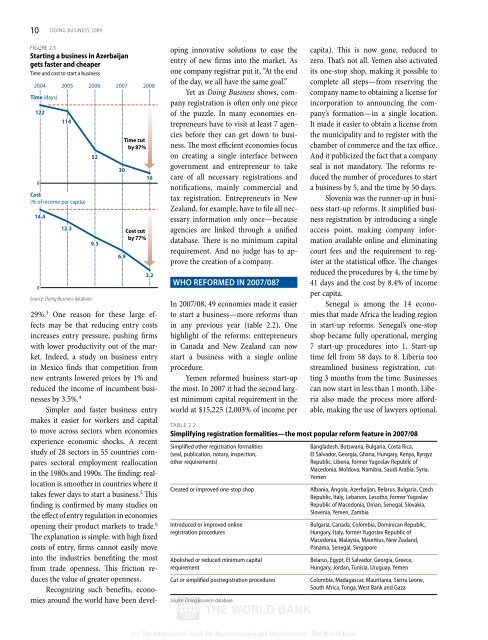DOING BUSINESS 2009 - JOHN J. HADDAD, Ph.D.
DOING BUSINESS 2009 - JOHN J. HADDAD, Ph.D.
DOING BUSINESS 2009 - JOHN J. HADDAD, Ph.D.
You also want an ePaper? Increase the reach of your titles
YUMPU automatically turns print PDFs into web optimized ePapers that Google loves.
7%Cut or simplified postregistration proceduresNote: A reform may include several reform features.10 Doing Business <strong>2009</strong>Source: Doing Business database.FIGURE 2.3Starting a business in Azerbaijangets faster and cheaperTime and cost to start a business2004Time (days)1220Cost(% of income per capita)14.402005 2006 2007 200811412.3Source: Doing Business database.529.3Time cutby 87%Cost cutby 77%306.9163.229%. 3 One reason for these large effectsmay be that reducing entry costsincreases entry pressure, pushing firmswith lower productivity out of the market.Indeed, a study on business entryin Mexico finds that competition fromnew entrants lowered prices by 1% andreduced the income of incumbent businessesby 3.5%. 4Simpler and faster business entrymakes it easier for workers and capitalto move across sectors when economiesexperience economic shocks. A recentstudy of 28 sectors in 55 countries comparessectoral employment reallocationin the 1980s and 1990s. The finding: reallocationis smoother in countries where ittakes fewer days to start a business. 5 Thisfinding is confirmed by many studies onthe effect of entry regulation in economiesopening their product markets to trade. 6The explanation is simple: with high fixedcosts of entry, firms cannot easily moveinto the industries benefiting the mostfrom trade openness. This friction reducesthe value of greater openness.Recognizing such benefits, economiesaround the world have been developinginnovative solutions to ease theentry of new firms into the market. Asone company registrar put it, “At the endof the day, we all have the same goal.”Yet as Doing Business shows, companyregistration is often only one pieceof the puzzle. In many economies entrepreneurshave to visit at least 7 agenciesbefore they can get down to business.The most efficient economies focuson creating a single interface betweengovernment and entrepreneur to takecare of all necessary registrations andnotifications, mainly commercial andtax registration. Entrepreneurs in NewZealand, for example, have to file all necessaryinformation only once—becauseagencies are linked through a unifieddatabase. There is no minimum capitalrequirement. And no judge has to approvethe creation of a company.Who reformed in 2007/08?In 2007/08, 49 economies made it easierto start a business—more reforms thanin any previous year (table 2.2). Onehighlight of the reforms: entrepreneursin Canada and New Zealand can nowstart a business with a single onlineprocedure.Yemen reformed business start-upthe most. In 2007 it had the second largestminimum capital requirement in theworld at $15,225 (2,003% of income percapita). This is now gone, reduced tozero. That’s not all. Yemen also activatedits one-stop shop, making it possible tocomplete all steps—from reserving thecompany name to obtaining a license forincorporation to announcing the company’sformation—in a single location.It made it easier to obtain a license fromthe municipality and to register with thechamber of commerce and the tax office.And it publicized the fact that a companyseal is not mandatory. The reforms reducedthe number of procedures to starta business by 5, and the time by 50 days.Slovenia was the runner-up in businessstart-up reforms. It simplified businessregistration by introducing a singleaccess point, making company informationavailable online and eliminatingcourt fees and the requirement to registerat the statistical office. The changesreduced the procedures by 4, the time by41 days and the cost by 8.4% of incomeper capita.Senegal is among the 14 economiesthat made Africa the leading regionin start-up reforms. Senegal’s one-stopshop became fully operational, merging7 start-up procedures into 1. Start-uptime fell from 58 days to 8. Liberia toostreamlined business registration, cutting3 months from the time. Businessescan now start in less than 1 month. Liberiaalso made the process more affordable,making the use of lawyers optional.Table 2.2Simplifying registration formalities—the most popular reform feature in 2007/08Simplified other registration formalities(seal, publication, notary, inspection,other requirements)Created or improved one-stop shopIntroduced or improved onlineregistration proceduresAbolished or reduced minimum capitalrequirementCut or simplified postregistration proceduresSource: Doing Business database.Bangladesh, Botswana, Bulgaria, Costa Rica,El Salvador, Georgia, Ghana, Hungary, Kenya, KyrgyzRepublic, Liberia, former Yugoslav Republic ofMacedonia, Moldova, Namibia, Saudi Arabia, Syria,YemenAlbania, Angola, Azerbaijan, Belarus, Bulgaria, CzechRepublic, Italy, Lebanon, Lesotho, former YugoslavRepublic of Macedonia, Oman, Senegal, Slovakia,Slovenia, Yemen, ZambiaBulgaria, Canada, Colombia, Dominican Republic,Hungary, Italy, former Yugoslav Republic ofMacedonia, Malaysia, Mauritius, New Zealand,Panama, Senegal, SingaporeBelarus, Egypt, El Salvador, Georgia, Greece,Hungary, Jordan, Tunisia, Uruguay, YemenColombia, Madagascar, Mauritania, Sierra Leone,South Africa, Tonga, West Bank and Gaza(c) The International Bank for Reconstruction and Development / The World Bank
















